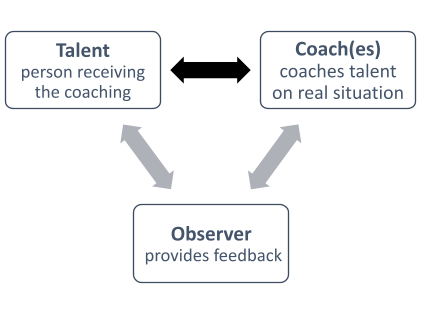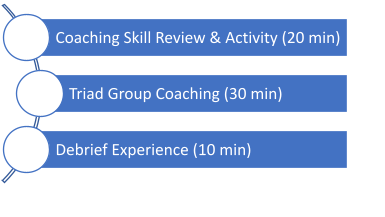The transfer of learning from the classroom to on-the-job performance is a common challenge for learning and development professionals. Skills training that is technical or procedural can be directly observed and refined until an acceptable level of performance is attained. However, communication and interpersonal skills, for example, are more nuanced and developed over time.
Providing ongoing opportunities to practice and apply these skills is necessary for proficiency beyond the classroom. While various methods can be utilized to reinforce what is taught in the classroom, peer coaching is an effective strategy to transfer and accelerate application of skills and concepts. Peer coaching can be simply described as two or more colleagues working together to practice skills, give and receive feedback and address challenges in a safe, supportive and judgment-free zone. The use of peer coaching described in this article was developed to provide post-education reinforcement of coaching skills for people leaders in a health care organization.
Peer power in health care
Health care is highly regulated, and as such, can be hierarchical across patient care work units and administrative departments. This often results in a “direct and tell” work culture, thereby suppressing individual capabilities of generating ideas, solving problems and learning from failure.
Coaching skills can foster these capabilities. Our organization wanted to create a culture where staff at all levels felt empowered and subsequently could achieve higher levels of individual, team and organizational performance. To achieve this, we felt it was imperative to grow coaching capabilities within leaders throughout the organization. One approach was to develop a coaching skills course to teach them the coaching essentials of cultivating a growth mindset, developing trusting relationships, and three core skills: powerful questions, deep listening and acknowledging strengths to elevate an individual’s awareness of and capacity to utilize those strengths.
The most common barrier to incorporating a coaching approach cited by graduates of the coaching course has been their natural tendency to be problem-solvers and provide direction and advice when a coaching approach may be more beneficial to the team or for the individual’s growth and development. The need for reinforcement and practice of the skills beyond the program was immediately apparent. We developed a peer coaching program called “Practice With Your Peers,” as a post-course experience to accelerate the fluency and application of coaching skills. With clear structure and guidelines in place, the peer coaching groups quickly become a safe space for practice and learning and foster close relationships for ongoing peer coaching, support and networking beyond the formal program.
“Practice With Your Peers” is a peer coaching group that meets for one hour a week for seven weeks. Each group has five participants and a certified coach/facilitator.
The program has been offered virtually and in-person with equal success. Participants must make a commitment to attend six out of seven sessions before registering for the program. Group agreements, including a shared commitment to confidentiality, is a key factor of success .
Figure 1: Group Agreements
Group Agreements My (Participant) Commitment
1. We will start and end on time. 2. Confidentiality is assured. 3. Everyone will take turns coaching and being coached. 4. Come prepared. 5. Notify facilitator if unable to attend. 6. All opinions are honored. 7. Commit to consistent and timely response to each session’s follow-up reflection email 8. The facilitator reserves the right to interrupt and refocus the process as needed. 9. Be fully present and avoid multitasking | I agree to: 1. Make every effort to attend each session on time. 2. Practice confidentiality 3. Coach and be coached by fellow group members. 4. Come to the session prepared. 5. Communicate absences in a timely manner 6. Demonstrate respect and curiosity for varying points of view. 7. Commit to completing action steps between sessions and responding to weekly reflection email. 8. Strive to help my fellow group members by participating meaningfully and respectfully. 9. Minimize all distractions, including email when possible. |
Equally important is a clear understanding of the expectations of their commitment to the program to maximize the experience for all participants. Also critical for success is coach facilitators who are skilled at creating a safe and trusting learning environment.
In these groups, each learner creates a learning goal they’d like to achieve to elevate their coaching proficiency by the end of the seven-week experience. The sessions are iterative, and designed to mirror the coaching process that includes commitment to action and accountability for progress.
Figure 2: Program Outline for Practice With Your Peers
Roles are rotated each week. One learner is the “talent” (the person receiving the coaching), one learner is the observer, and the remaining three learners practice coaching the talent on a real situation in five- to seven-minute increments.
Figure 3: Participant roles in Practice With Your Peers

The debrief that follows is a rich feedback session for each learner practicing the coaching skills. The feedback is delivered by the observer and supplemented by the coach-facilitator.
Finally, each learner reflects and vocalizes what they learned in the practice session and outlines a new action step toward their goal, for which they are accountable in sharing results or new insights at the next session.
The small group format provides an opportunity to practice the skills in a real-time environment and receive immediate feedback. Groups can establish themselves as a structured environment that fosters accountability between learners who are all committed to developing the same skill set.
The small group size also allows learners time and space to regularly speak their minds. Listening to the challenges of their peers sheds light on shared workplace issues, and can additionally diminish the sense of isolation a leader may feel in addressing these issues.
Surveys point to program success
Consistent themes of impact reported by participants of “Practice With Your Peers” from post-program surveys are increased confidence and self-perceived effectiveness as a leader, enhanced listening skills, more trusting work environments, feeling less burdened as the “problem-solver” and having a more engaged and empowered staff.
A formative evaluation assessed the impact of the peer coaching experience on work unit engagement scores — a measure that is assessed every two years by the organization. Forty-one percent of respondents had been in the same leadership role over the two-year period, and were able to compare engagement scores in their work unit from before and after the peer coaching experience. Of those respondents, 67 percent reported an increase in work unit engagement scores. While statistical correlations between the use of coaching skills and the engagement scores is difficult to assess, respondents attributed 60 percent of the increased scores to their use of coaching skills.
Successful connections ahead
“Coaching Connection” is a less intense version of “Practice With Your Peers,” but is an adaptation of the peer coaching format. This program, also for graduates of the main coaching course, is a one-hour monthly meeting (virtual or in-person) designed to offer an opportunity to practice the coaching skills. Participants can sign up for as many monthly sessions as their schedule allows. The format of “Coaching Connection” consists of the coach/facilitator providing a short overview of one coaching skill or principle, coupled with a brief large group application activity.
Figure 4: Program Outline for Coaching Connection

Participants are then grouped in triads to practice coaching in brief segments using real situations. They rotate the role of coach, talent, and observer in short segments so that everyone gets to practice and receive feedback. The coach/facilitator can briefly join a few breakout rooms as time allows to provide encouragement and offer a piece of feedback where appropriate. Over 95 percent of participants said they expect positive results from using the skills they learn, and would recommend the program to others.
Although this article describes programs specific to developing coaching skills, these formats have proved successful in a variety of other ways. For example, we have also used peer coaching groups in a course on having effective difficult conversations. By strengthening their ability to use the learned skills through the peer coaching experience, 89 percent of participants surveyed reported resolution of work-related problems, 86 percent reported improved relationships and 77 percent reported increased ability to coach others on the skills.
In short, peer coaching experience is an effective way to improve the transfer of learning from the classroom to everyday work in an accelerated fashion and enhances the overall performance of the learner. While more rigorous measures to assess the impact of the peer coaching experience on teams have not been undertaken, there is much anecdotal evidence that indicates higher team performance in organizations in which leaders participated in peer coaching.
















